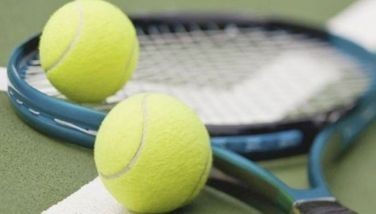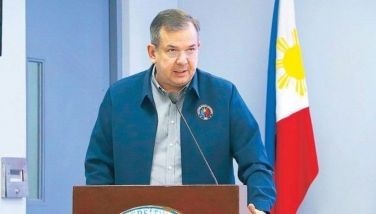When sports becomes matter of national interest
If we are to accept that sports have evolved into complex organizations and big business characterized by commercialism as asserted by Arthur T. Johnson and James H. Frey, in their book, “Government and Sport” and that sports is used by governments as instruments of international diplomacy and international policy, there would have been a great possibility of government having stepped in had not Solar Sports and Manny Pacquiao sorted out their misunderstanding over the local television rights of the upcoming Pacquiao-Ricky Hatton fight on May 2 in Las Vegas.
Who knows, some government force may have weighed in at a very early stage to get the parties to put their acts together. William Tieng, the eldest among the Tieng siblings, is not known for being combative. As William said right after Pacquiao’s surprise announcement of rescinding his contract with Solar, “We have a contract with Manny and Wilson (William’s younger brother) will try to clarify this. We’re not the type to go to court at every turn and pick fights. You know me, we always settle things amicably.”
As it turned out, things were settled amicably with Pacquiao apologizing and admitting there were no contract violations.
Like it or not, the showing of the Pacquiao-Ricky Hatton has been imbued with national interest, so to speak, and the non-airing of that fight in the Philippines would have created another problem for an already beleaguered government facing one challenge, scandal and controversy after another.
Most experienced sports administrators and policy makers, especially those who have seen sports used as an instrument of international diplomacy and international communications, will insist that separation of sport and state no longer exists, if it ever did - some will even add. Johnson and Frey say that sport always has been seen as a visible and effective means to communicate national and international policy.
Both scholars point out that in some nations such as Russia and countries of Eastern Europe, sport is very much part of the state apparatus. In fact, there is usually a Minister of Sport who retains a Cabinet-level position. The directions and organizational forms taken by sport in these countries are very much the result of policy deliberations by governmental bodies.
In the United States, direct intervention, at least by allocation of tax monies, is less prevalent. Intervention exists but is less obvious. For example, even though the US Congress chartered the United States Olympic Committee (USOC), it rarely interferes in the USOC’s daily operations, the 1980 boycott of the Moscow Olympics being the exception.
Somewhere in between, we find the British, Western European, and if I may add, the Canadian, Australian and Philippine systems, which permit sport autonomy, but because public monies are available to sport bodies, governments can have a direct policy impact on sport in those countries.
Regardless of the model on government involvement in sports, sports and politics always have been institutional partners in any society, particularly where that society’s reputation or national pride are at stake. When Filipino athletes compete abroad and carry the name “PHILIPPINES” on their jerseys and jackets and are regarded as official entries of the Philippines, would not national reputation or pride be at stake? It would be another matter if these athletes carried the name of the president or chairman of their national sports association, in which case, the state would really not have anything to do with them except to provide them with the necessary travel documents and basic protection as tourists in the host country.
Kenya, which has almost completely dominated marathon racing and is poorer than the Philippines, is perhaps one model of a viable and successful partnership between sport and the state.
In an article, “The Runners of Kenya,” Linus Gitahi writes that it was fairly recently that an important aspect of the Kenyan formula has been analyzed - their training and diet. More on this next week.
* * *
The Santuario de San Jose/Men of St. Joseph (MOSJ) second Charity golf tournament was held successfully on March 13 at the south course of the Valley Golf and Club. The tournament is a fund raiser for San Jose’s and MOSJ’s many beneficiaries, including the SilongTanglaw Foundation for Street Children. The tournament’s generous sponsors were San Miguel Corp., Pagcor, Manny Sta. Cruz, Abacus Securities of Paul Soo, The Glass Garden, Pizza Hut, TMS Shipping of Terry Capistrano, Warren Padilla, Security Bank, Pacsports, Dynamic Sports and the Golf Distributors Association of the Philippines. Overall gross winner was Augustin Mata (78) and Aristeo Mata (lowest net of 79). Other winners were Class A - Raymund Atendido (net score of 71) and Santiago Duenas (71); B - Ike Yap (72) and Gerry Francisco (72); and C - Vincent Singson (73) and Henry Fernandez (73).
- Latest
- Trending






























